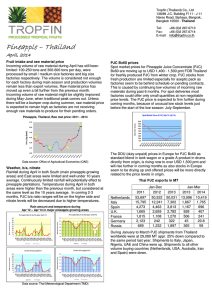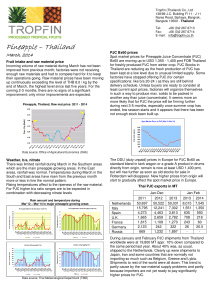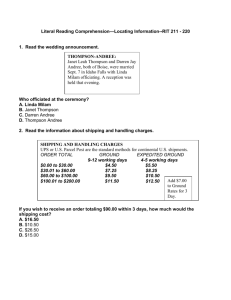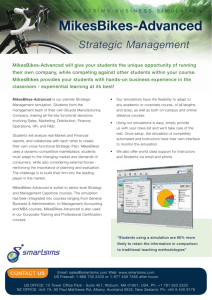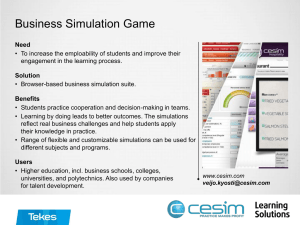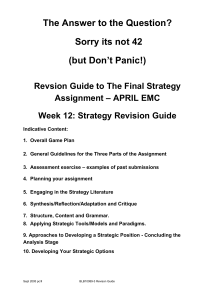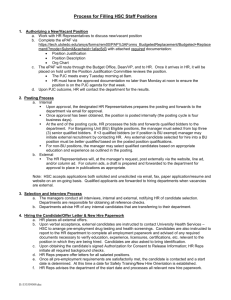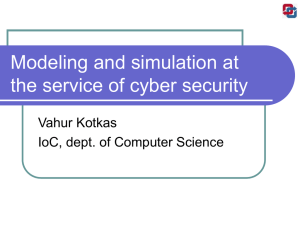Title: The Application of Computer Simulations to Enhance Decision
advertisement
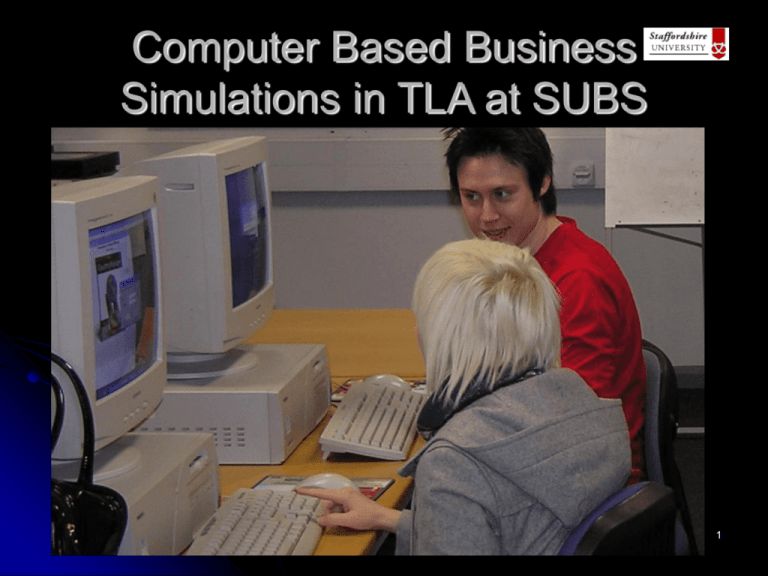
Computer Based Business Simulations in TLA at SUBS pjc FELTS March 08 1 Session Objectives Shortcoming's of Traditional Case Based Approaches to Teaching, Learning & Assessment Can Computer Based Business Simulations (CBBS) “Create the Difference”? Share both student & my own experiences of using simulations in Formative and Summative assessment. pjc FELTS March 08 2 Computer Based Business Simulations CBBS A Definition. As any system that: “duplicates the features, appearance and characteristics of a real business or management system”. Feinstein and Mann (in Kendall et al 2003) Compare above definition with the text based case study approach (HBS 1920’s) - can text based TLA fit the same definition? pjc FELTS March 08 3 Adoption of CBBS Over 95% of AACSB (American Assembly of Collegiate Schools of Business) and over 60% of all large companies use business simulations in their programmes. (Wolfe & Luethge, 2003) UK Adoption Levels? pjc FELTS March 08 4 Background The majority of texts on strategic management, follow the same simplistic formulae and structure in terms of the strategy process: Internal & External Analysis, Formulation or Development Implementation/change/control?? Strategy & Business Decision Making is a more integrated, complex dynamic & iterative process (longitudinal or incremental, prescriptive vs. emergent etc.) pjc FELTS March 08 5 Learning outcomes and preparation for the Reality of Practice Rugman, 2006 pjc FELTS March 08 6 Some Argument: Mintzberg & Quinn (1991) contend that the text based case method can in fact be counter productive by giving misleading, if not even dangerous, over-simplifications of the realities of such processes and That output tends to converge upon the lecturer’s own analysis and recommendations. pjc FELTS March 08 7 Hitting the Learning Outcomes Analysis, learning, application, problem solving, communication and reflection Can we properly test these learning’s using a text based case? Can we with do so by incorporating a Simulation? pjc FELTS March 08 8 A growing & substantial body of literature supports the argument that the understanding of complex management decision making concepts is enhanced when computer simulations are used as pedagogical tools (Wolfe & Luethge, 2003; Zantow et al., 2005). Such research has established the positive and complementary roles simulations play in Promoting deep, active, experiential and generative learning and The facilitation of effective group work, communications and problem solving skills (Kendall & Harrington (2003), Wolfe & Luethge (2005), Jennings, (2001), Pray and Rabinowitz (1989) etc etc… pjc FELTS March 08 9 Deep vs. Surface Learning Adapted form Ramsden (1999:p43) Approaches To Learning/Assessment HOW “structural aspect”: the act of experiencing, of organising, of structuring Holistic Preserves the structure, focuses on the whole in relation to the parts. Atomistic Distorts the structure, focuses on the parts, segments the whole. WHAT “Meaning aspect”: that which is experienced: the significance of the task Deep Focuses on the integrated nature of the task pjc FELTS March 08 Surface Focuses on the signs (e.g. the wordsentence level of the text) 10 A Comparative Study CBBS vs. Text Based Case. 1. 2. Kendall & Harrington (2003) argue that text based cases: lack a sense of realism, lack interaction with the environment and competition and provide no feedback on student decisional (problem solving) processes and which are essential abilities and competences required for professional practice. They undertook a comparative 4 year study re CBBS vs. text based learning pjc FELTS March 08 11 The output in terms of their hypothesis were “statistically tested” as follows: H1: that CBBS provide higher skills compared with text based cases, H2: higher level of learning attained using CBBS, H3: better team skills and H4: no increase in level of difficulty of use pjc FELTS March 08 12 Computer Based Business Simulations at SUBS pjc FELTS March 08 13 Simulations to Date 1. 2. 3. International Strategic Management Level 3 in 2007 – pilot 15 students Strategic Management Level 3 2007/8 41 Students (2 classes) International Strategic Management 2008 - 43 Students…….(1 class…!) http://www.interpretive.com/ pjc FELTS March 08 14 pjc FELTS March 08 15 pjc FELTS March 08 16 pjc FELTS March 08 17 pjc FELTS March 08 18 pjc FELTS March 08 19 Assessment Design International Strategic Management 30% Group Work Report on Simulation 70% Individual Case Assignment – building upon the simulated context Strategic Management Choice of three mini - portfolio topics based on first five weeks of module 50% Group Work Report on Simulation Two further learning portfolio’s with one a reflective journal on simulation re Learning Outcomes pjc FELTS March 08 20 Student Feedback Questionnaire ISM 2007 “The use of the simulation to facilitate the understanding of the module gave us the chance to operate a “real business” “The simulation was a good point for group work “The simulation was (an) enhancing experience in a business environment “The simulation was very useful “The simulation helps to see how the theory can be applied. Develops a better understanding “Good learning structure with the simulation pjc FELTS March 08 21 Questionnaire: Strongly agree to Strongly Disagree (Scale : 3 max, 2, 1, -1, -2, -3 min: sample 15) I found the International Strategy Simulation enhanced my learning experience on this module. 2.5 I found the simulation gave a me the opportunity to learn in a dynamic performance orientated competitive environment (compared to traditional text based learning). 2.3 I found the group work element of the simulation to overall be positive. 2.3 I found the package easy to use and felt it was a well supported environment. 2.3 I would be positive towards the use of business simulations in pjc FELTS March 08 22 future. 2.4 From: marketing@capsim.com [mailto:marketing@capsim.com] Sent: Wed 2/20/2008 22:22 To: CONSIDINE Peter J Subject: Capsim: Students want to learn Professor??? Considine, Sometimes you receive an Email you simply have to share, because it tells the whole story: "Here’s a new catch-phrase for Dan – “My students are learning in spite of themselves!” "This is no small 'nuance'. Instead of working on something so as to learn it or master it, my students are engaging in the simulation and their learning is a result of their engagement. pjc FELTS March 08 23 Email cont. "I’ve just seen the shift in my students. Just this week. Many of them are now engaged in “beating this thing”. They want to make it work. "I’ve never seen or experienced this in a book! Are you getting the significance of this? My students are asking me to explain the contribution margin parameters, not because they “have to know it”, but because they WANT to know how to beat the simulation! “ "We’ve started registration for our Spring term classes. I’m scheduled in a 450 seat auditorium – expecting 450 students. The moral of the story is: Students “learn by doing”. Give them material that is engaging, involving and educational. They'll do the rest…? pjc FELTS March 08 24 A new Learning Outcome?? “The Ability To Perform Competitively” A Simulation Workshop?? pjc FELTS March 08 25 Thank you pjc FELTS March 08 26
